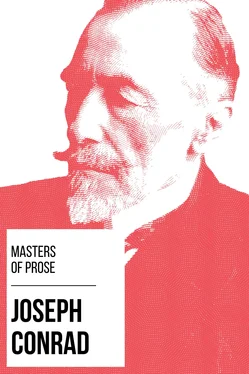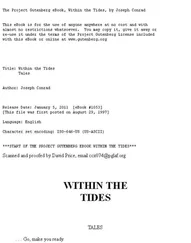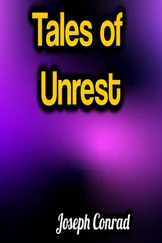In the retrospect of a life which had, besides its preliminary stage of childhood and early youth, two distinct developments, and even two distinct elements, such as earth and water, for its successive scenes, a certain amount of naiveness is unavoidable. I am conscious of it in these pages. This remark is put forward in no apologetic spirit. As years go by and the number of pages grows steadily, the feeling grows upon one, too, that one can write only for friends. Then why should one put them to the necessity of protesting (as a friend would do) that no apology is necessary, or put, perchance, into their heads the doubt of one's discretion? So much as to the care due to those friends whom a word here, a line there, a fortunate page of just feeling in the right place, some happy simplicity, or even some lucky subtlety, has drawn from the great multitude of fellow beings even as a fish is drawn from the depths of the sea. Fishing is notoriously (I am talking now of the deep sea) a matter of luck. As to one's enemies, they will take care of themselves.
There is a gentleman, for instance, who, metaphorically speaking, jumps upon me with both feet. This image has no grace, but it is exceedingly apt to the occasion—to the several occasions. I don't know precisely how long he has been indulging in that intermittent exercise, whose seasons are ruled by the custom of the publishing trade. Somebody pointed him out (in printed shape, of course) to my attention some time ago, and straightway I experienced a sort of reluctant affection for that robust man. He leaves not a shred of my substance untrodden: for the writer's substance is his writing; the rest of him is but a vain shadow, cherished or hated on uncritical grounds. Not a shred! Yet the sentiment owned to is not a freak of affectation or perversity. It has a deeper, and, I venture to think, a more estimable origin than the caprice of emotional lawlessness. It is, indeed, lawful, in so much that it is given (reluctantly) for a consideration, for several considerations. There is that robustness, for instance, so often the sign of good moral balance. That's a consideration. It is not, indeed, pleasant to be stamped upon, but the very thoroughness of the operation, implying not only a careful reading, but some real insight into work whose qualities and defects, whatever they may be, are not so much on the surface, is something to be thankful for in view of the fact that it may happen to one's work to be condemned without being read at all. This is the most fatuous adventure that can well happen to a writer venturing his soul among criticisms. It can do one no harm, of course, but it is disagreeable. It is disagreeable in the same way as discovering a three-card-trick man among a decent lot of folk in a third-class compartment. The open impudence of the whole transaction, appealing insidiously to the folly and credulity of mankind, the brazen, shameless patter, proclaiming the fraud openly while insisting on the fairness of the game, give one a feeling of sickening disgust. The honest violence of a plain man playing a fair game fairly—even if he means to knock you over—may appear shocking, but it remains within the pale of decency. Damaging as it may be, it is in no sense offensive. One may well feel some regard for honesty, even if practised upon one's own vile body. But it is very obvious that an enemy of that sort will not be stayed by explanations or placated by apologies. Were I to advance the plea of youth in excuse of the naiveness to be found in these pages, he would be likely to say “Bosh!” in a column and a half of fierce print. Yet a writer is no older than his first published book, and, not withstanding the vain appearances of decay which attend us in this transitory life, I stand here with the wreath of only fifteen short summers on my brow.
With the remark, then, that at such tender age some naiveness of feeling and expression is excusable, I proceed to admit that, upon the whole, my previous state of existence was not a good equipment for a literary life. Perhaps I should not have used the word literary. That word presupposes an intimacy of acquaintance with letters, a turn of mind, and a manner of feeling to which I dare lay no claim. I only love letters; but the love of letters does not make a literary man, any more than the love of the sea makes a seaman. And it is very possible, too, that I love the letters in the same way a literary man may love the sea he looks at from the shore—a scene of great endeavour and of great achievements changing the face of the world, the great open way to all sorts of undiscovered countries. No, perhaps I had better say that the life at sea—and I don't mean a mere taste of it, but a good broad span of years, something that really counts as real service—is not, upon the whole, a good equipment for a writing life. God forbid, though, that I should be thought of as denying my masters of the quarter-deck. I am not capable of that sort of apostasy. I have confessed my attitude of piety toward their shades in three or four tales, and if any man on earth more than another needs to be true to himself as he hopes to be saved, it is certainly the writer of fiction.
What I meant to say, simply, is that the quarter-deck training does not prepare one sufficiently for the reception of literary criticism. Only that, and no more. But this defect is not without gravity. If it be permissible to twist, invert, adapt (and spoil) Mr. Anatole France's definition of a good critic, then let us say that the good author is he who contemplates without marked joy or excessive sorrow the adventures of his soul among criticisms. Far be from me the intention to mislead an attentive public into the belief that there is no criticism at sea. That would be dishonest, and even impolite. Everything can be found at sea, according to the spirit of your quest—strife, peace, romance, naturalism of the most pronounced kind, ideals, boredom, disgust, inspiration—and every conceivable opportunity, including the opportunity to make a fool of yourself, exactly as in the pursuit of literature. But the quarter-deck criticism is somewhat different from literary criticism. This much they have in common, that before the one and the other the answering back, as a general rule, does not pay.
Yes, you find criticism at sea, and even appreciation—I tell you everything is to be found on salt water—criticism generally impromptu, and always viva voce, which is the outward, obvious difference from the literary operation of that kind, with consequent freshness and vigour which may be lacking in the printed word. With appreciation, which comes at the end, when the critic and the criticised are about to part, it is otherwise. The sea appreciation of one's humble talents has the permanency of the written word, seldom the charm of variety, is formal in its phrasing. There the literary master has the superiority, though he, too, can in effect but say—and often says it in the very phrase—“I can highly recommend.” Only usually he uses the word “We,” there being some occult virtue in the first person plural which makes it specially fit for critical and royal declarations. I have a small handful of these sea appreciations, signed by various masters, yellowing slowly in my writing-table's left hand drawer, rustling under my reverent touch, like a handful of dry leaves plucked for a tender memento from the tree of knowledge. Strange! It seems that it is for these few bits of paper, headed by the names of a few Scots and English shipmasters, that I have faced the astonished indignations, the mockeries, and the reproaches of a sort hard to bear for a boy of fifteen; that I have been charged with the want of patriotism, the want of sense, and the want of heart, too; that I went through agonies of self-conflict and shed secret tears not a few, and had the beauties of the Furca Pass spoiled for me, and have been called an “incorrigible Don Quixote,” in allusion to the book-born madness of the knight. For that spoil! They rustle, those bits of paper—some dozen of them in all. In that faint, ghostly sound there live the memories of twenty years, the voices of rough men now no more, the strong voice of the everlasting winds, and the whisper of a mysterious spell, the murmur of the great sea, which must have somehow reached my inland cradle and entered my unconscious ear, like that formula of Mohammedan faith the Mussulman father whispers into the ear of his new-born infant, making him one of the faithful almost with his first breath. I do not know whether I have been a good seaman, but I know I have been a very faithful one. And, after all, there is that handful of “characters” from various ships to prove that all these years have not been altogether a dream. There they are, brief, and monotonous in tone, but as suggestive bits of writing to me as any inspired page to be found in literature. But then, you see, I have been called romantic. Well, that can't be helped. But stay. I seem to remember that I have been called a realist, also. And as that charge, too, can be made out, let us try to live up to it, at whatever cost, for a change. With this end in view, I will confide to you coyly, and only because there is no one about to see my blushes by the light of the midnight lamp, that these suggestive bits of quarter-deck appreciation, one and all, contain the words “strictly sober.”
Читать дальше












